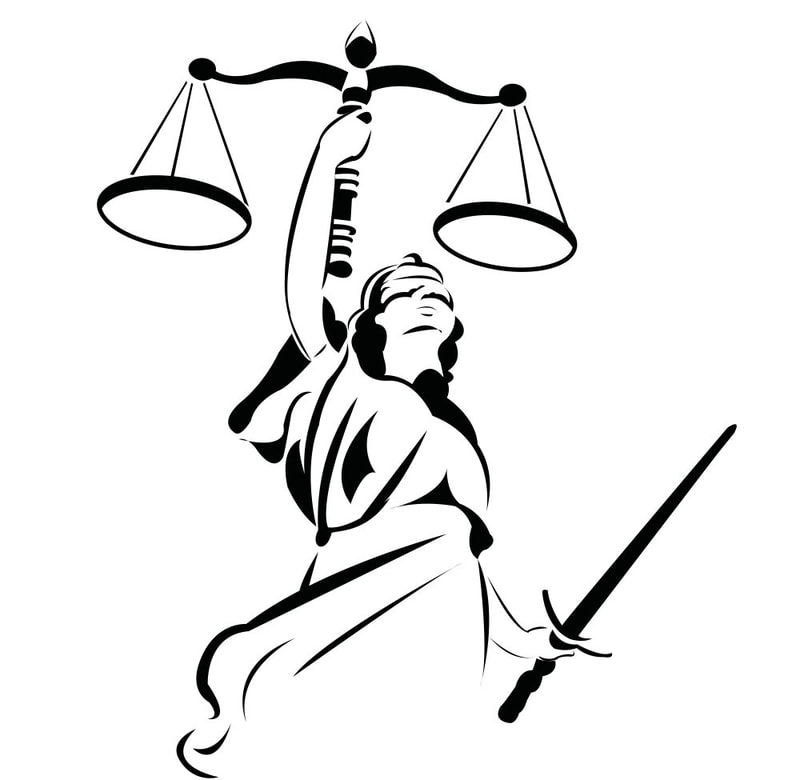FIND YOUR VOICE AND BE HEARD
For centuries we have been shown the symbols and history of American justice. The most antient law symbol is the Scales of Justice, symbolizing the process of weighing facts and evidence in order to reach a verdict. In addition, the scales serve as a visual representation of the justice system's responsibility to restore balance in society. Scales also represent the decision rendered by Justice to determine the "weight" of evidence presented in support of or against a claim.
Lady Justice and her sword recognized as a symbol of power represents the supremacy of reason rather than relying solely on physical strength. The Sword denotes the power to slice through barriers and hindrances, allowing for the revelation of truth in any given case.
The wooden gavel shows the judge's power and brings order to a court room, a ceremonial scepter representing the judge's authority of the courts decision-making power.
The robe worn by judges carries a significant symbolism, representing the authority and impartiality of the court. The gavel and robe both symbolize an essential role in conveying power within the judicial system.
Society has established norms for respectful behavior in a courtroom. We recognize the need to show respect to judges, attorneys, and other participants without being taught how to act in a courtroom. We instinctively understand the proper behaviors by not interrupting proceedings, speak out of turn, or display disruptive emotions. These unwritten rules align with our understanding of respectful communication.
What is important to understand is, "What can a victim do if they feel they are not being treated with respect during a court proceeding?"
Below are some steps you can take to address the situation.
Stay Calm and Composed:
Remember that you have the right to be treated respectfully throughout the legal process. Advocating for yourself and seeking assistance from professionals can help address any mistreatment you experience. You have a voice and you have the right to be heard.
Lady Justice and her sword recognized as a symbol of power represents the supremacy of reason rather than relying solely on physical strength. The Sword denotes the power to slice through barriers and hindrances, allowing for the revelation of truth in any given case.
The wooden gavel shows the judge's power and brings order to a court room, a ceremonial scepter representing the judge's authority of the courts decision-making power.
The robe worn by judges carries a significant symbolism, representing the authority and impartiality of the court. The gavel and robe both symbolize an essential role in conveying power within the judicial system.
Society has established norms for respectful behavior in a courtroom. We recognize the need to show respect to judges, attorneys, and other participants without being taught how to act in a courtroom. We instinctively understand the proper behaviors by not interrupting proceedings, speak out of turn, or display disruptive emotions. These unwritten rules align with our understanding of respectful communication.
What is important to understand is, "What can a victim do if they feel they are not being treated with respect during a court proceeding?"
Below are some steps you can take to address the situation.
Stay Calm and Composed:
- It’s natural to feel upset or frustrated but try to remain calm and composed. Take deep breaths and focus on the proceedings. You may want to wait for the court proceeding to take a break and rationalize your feelings before addressing your concerns. If you have established open communication with the prosecutor in your case, he/she would be a good source to discuss your feelings or concerns.
- If you feel disrespected by anyone in the courtroom (such as attorneys, judges, or other participants), you can politely express your concerns. The most important thing to remember is to stay calm and speak with a tone that will be heard. Disrupting a court hearing with a loud tone could result in you being removed from the courtroom.
- Raise your hand or wait for an appropriate moment, and then address the issue. For example, you can say, “Excuse me, Your Honor, I feel disrespected by the tone used. Could we please maintain a respectful atmosphere?”
- Every federal court has a Victim-Witness Program that assists victims and witnesses throughout the legal process.
- Reach out to the Victim-Witness Coordinator or a Victim Advocate for guidance. They can provide information about your rights and help address any mistreatment.
- As a victim, you have certain rights, including:
- The right to be treated with fairness and respect for your dignity and privacy.
- The right to be reasonably protected from the accused offender.
- The right to be notified of court proceedings.
- Familiarize yourself with all your rights and assert them when necessary.
- If disrespectful behavior persists, make a note of the incident. Include details such as who was involved, what was said, and when it occurred.
- This documentation can be useful if you need to file a complaint later.
- Consult with an attorney or legal advocate. They can advise you on the best course of action based on your specific situation.
- If the mistreatment continues, they may recommend filing a formal complaint.
- Remember that you have rights, and it’s essential to assert them and use your voice. Seek support, stay informed, and take action if you believe your rights have been compromised during the legal process.
- Depending on the severity of the disrespect, you can file a complaint with the appropriate authority.
- This could be the court administration, the state bar association (for attorneys), or the judicial conduct board (for judges).
Remember that you have the right to be treated respectfully throughout the legal process. Advocating for yourself and seeking assistance from professionals can help address any mistreatment you experience. You have a voice and you have the right to be heard.
